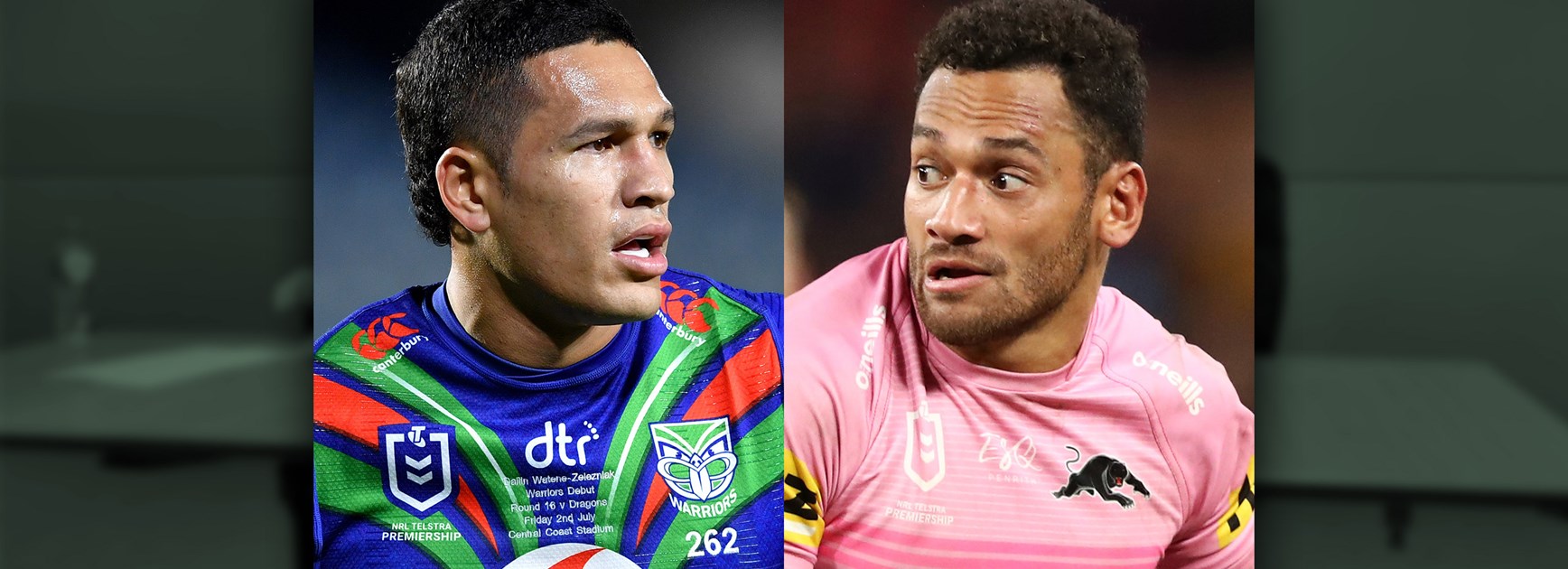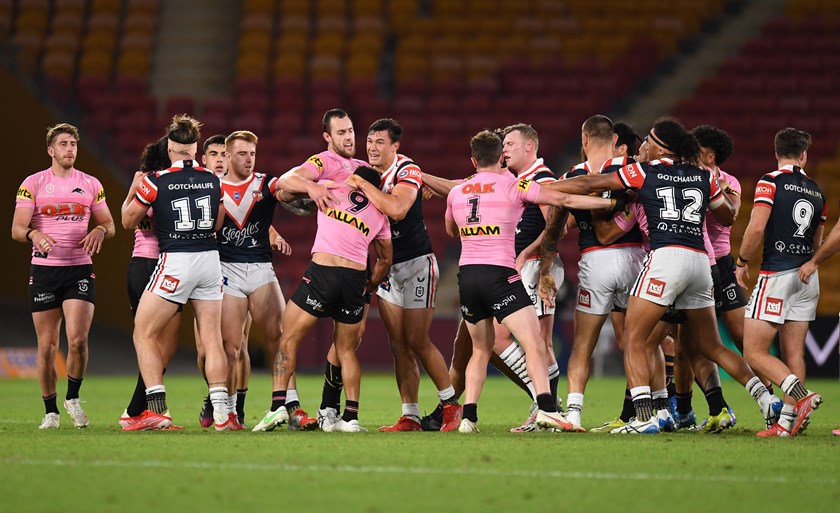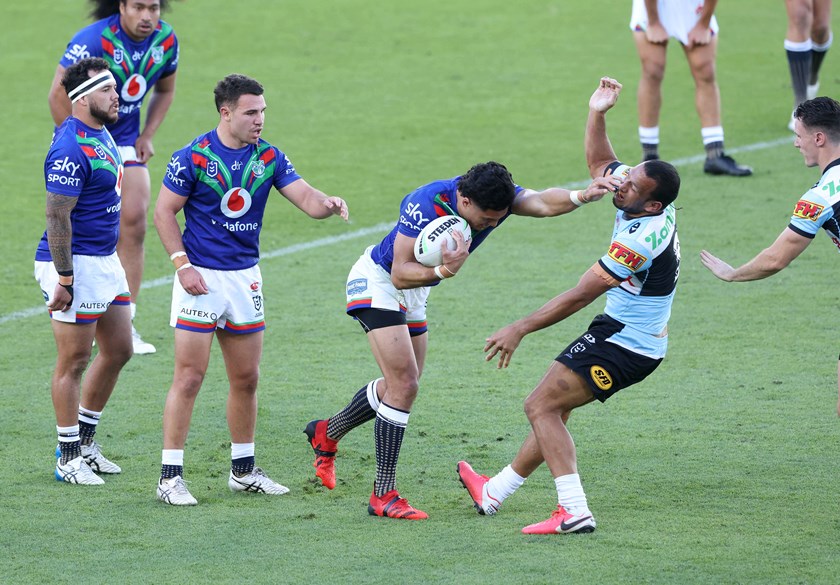
Live coverage of the NRL judiciary hearings for Dallin Watene-Zelezniak and Apisai Koroisau.
Refresh this page for regular updates during the night.
8.45pm: The verdict is in: Guilty verdict upheld - 140 demerit points for Korosiau and a one-match ban.
8.21pm: He may not be a lawyer, but Cleary certainly sounds like one. He starts by saying that Koroisau was charged with contrary conduct, defined as behaving in a way that is contrary to the true spirit of the game.
But he notes that he couldn't find a definition for "true spirit", "melee", or "unnecessary contact".
That, in Cleary's view, makes the case "subjective" – and brings his vast rugby league experience into play.
"Api, playing hooker, has to make many decisions in many games that he's played. These decisions are based around instincts and this decision was certainly that," Cleary says.
"Tago reacts in a fearful manner [to Waerea-Hargreaves] and so [Koroisau] made a decision, instinctively, based on a few things: Tago is a five-game 19-year-old, Waerea-Hargreaves is a 200-game 32-year-old who is twice his size."
Cleary adds that Koroisau chose to defend his teammate and stop what looked like being an "incident". He says he then sought out Waerea-Hargreaves once the scuffle had broken out "purely to communicate".
"Mr McGrath mentioned many times that this was a melee … 500 NRL games as a player and coach, I'm not sure I would agree that this was a melee. Mr McGrath mentioned there were players smiling in there," Cleary says.

"I think what we really come down to is Api was actually trying to protect defuse the melee – if that's a melee.
"There were three things Api could have done – he could have gone over and attacked Waerea-Hargreaves … he could have done what he did to protect and defuse the situation, or he could have done nothing.
"[The third option] I would argue is more against the spirit of the game if he was to leave his young teammate against an intimidating and experienced foe.
Judiciary chairman Geoff Bellew is now instructing the panel. In response to Cleary questioning the definition of melee, he says it's an "ordinary English word" and would be applied its "ordinary English" meaning referring to a "fight or scuffle".
The panel is now deliberating.
8.05pm: Making his submission, McGrath reiterates that "even with good intentions, what [Koroisau] did was going to aggravate – and did aggravate – the situation as sure as night follows day".
"It's conduct that's really not in the spirit of the game," he adds.
McGrath says Koroisau's behaviour sparked the melee – "which is not a good look for the game" – and in turn created a "chance of really dangerous contact" as the referee lost control.
"Player Koroisau comes in and it's a shove. He blindsides [Waerea-Hargreaves] and just shoves him completely off his feet. Player 12 from the Roosters of course takes objection to that," he says.
After the melee started, McGrath submits that "Koroisau comes around and escalates the situation again. He seeks out Waerea-Hargreaves again and there's contact between them again.
"To say you're protecting your teammate, it may well be a rugby league [trait], but it's really not mitigating," McGrath says.
7.55pm: Koroisau says he felt justified in shoving Waerea-Hargreaves because the Roosters prop was "bullying" his 19-year-old Panthers teammate Izaak Tago.
He claims he saw Tago pushed by Waerea-Hargreaves "in the face with what looked like a forearm and then collared on the ground in a very vulnerable position".
"I only did it to tell [Waerea-Hargreaves] to stop trying to bully 19-year-old kids on the field … I didn't think there was any malice in the push," he says.
"I didn't try to take his head off or collar him back. I just wanted to get him off ... I just wanted to let him know that what he was doing – trying to pick on a 19-year-old – wasn't on."
NRL prosecutor Peter McGrath takes up cross-examination and asks Koroisau whether, despite his protective intentions, his actions meant a melee was "inevitable".
"Not necessarily. I'm not sure what Tago would have done if he got up himself," the dummy-half says.
Questioned about what he was protecting Tago from, Koroisau says: "The possible threat of Jared coming down on top of him again … I don't think anyone wants to be underneath Jared Waerea-Hargreaves.
"I believe [the melee] started because Jared put a forearm on a player's chin and then continued to collar him on the ground."
7.43pm: Before asking Koroisau to give evidence, Ivan Cleary asks: "Am I able to say something quickly?"
"You can try, we'll see how we go," Bellew responds.
Cleary stresses that he means "no disrespect" by representing Koroisau and is assured by Bellew that he is as entitled as anyone to defend his player.
"We think it's very much a rugby league argument," Cleary says.
7.34pm: Panthers hooker Api Koroisau and coach Ivan Cleary – who will be representing his player in a rare occurrence – have joined the video call in a bid to overturn a one-match ban.
Cleary is tasked with getting Koroisau off a grade-one contrary conduct charge after he was deemed to have sparked a melee by shoving Roosters prop Jared Waerea-Hargreaves on Saturday.
Titans head of performance and culture Mal Meninga unsuccessfully defended star forward David Fifita earlier this season, but Cleary is the first coach in some time to try his hand at being a lawyer.
"I'm not overly familiar. I've been to a few of these but this is the first time I've [been in this position]," Cleary says at the outset before judiciary chairman Geoff Bellew runs through the basic procedures.
Even if he can't convince the panel to let Koroisau play in Friday's clash with the Dragons, the dummy-half will still only miss one match as well as incurring 40 carryover points.
Koroisau could've escaped with a fine if he had a clean record and pleaded guilty, but two non-similar offences in the past two years meant 40 percent loading was applied to the charge.
Again, Peter McGrath is the NRL prosecutor.
7.24pm: The first verdict is in and Dallin Watene-Zelezniak has been found guilty and suspended this week, with 40 carryover points.
7.01pm: The panel is now deliberating.
6.54pm: Judiciary chairman Geoff Bellew is now instructing the panel and recapping the arguments.
6.45pm: McLeod takes umbrage with the basis of McGrath's argument being that Watene-Zelezniak dropped his knee towards the ground while his left foot remained elevated.
"[The prosecution's case] seems to make a complaint that player Watene-Zelezniak tried to use his knee to get up to play the ball," he says.
"It can be a completely legitimate way to get up to play the ball," McLeod adds, saying it's common for players to leverage themselves to their feet by using a knee.
He points out that Watene-Zelzniak eventually succeeded in using his right knee as a "fulcrum" to regain his feet and play the ball.
McLeod also contends that Chambers put himself in an "uncommon and problematic" position because he didn't "roll away" from the ruck as is the norm.
"He instead turns his body and rolls inwards towards the meat of the play-the-ball area," he says.
The lawyer reminds the panel that in a "contact sport played at high speeds by highly trained athletes", it's a given that incidental and accidental contact will occur.

6.36pm: NRL prosecutor McGrath continues with his argument that Watene-Zelezniak "brings his weight down" on Chambers with his knee in a "highly careless nature".
"The knee just goes down straight on the head," he says.
"The left foot is up in the air … that contact with the head of the tackling player was, I submit, careless and doesn't really reflect with what the player himself tells you in attempting to go left and play the ball quickly.
"His conduct was contrary to the true spirit of the game."
McGrath focuses on Watene-Zelezniak dropping towards the ground - which the player says was only so he could get up and play the ball - while his left foot remained in the air.
6.23pm: Defence counsel McLeod calls Watene-Zelezniak to give evidence. He recounts the incident, saying he felt "pinned down" by Chambers and Ronaldo Mulitalo having been tackled after fielding a bomb.
In attempting a quick play-the-ball, he claims he tried to "clear Chambers' torso" on the ground: "I couldn't go any way forward because I was being held.
"I decided to go to the left and got up and played the ball … going left was my only option."
The winger says he didn't realise he'd contacted Chambers with his knee or upper shin until Warriors manager Dan Floyd notified him after receiving the charge sheet.
Asked if he intended to knee Chambers - who he says he didn't realise was underneath him because "everything happened so fast" - Watene-Zelezniak firmly responds: "No, no way."
"I don't think I was careless at all. At first, I tried to get over his torso to clear him," he adds.
In cross-examination, NRL prosecutor McGrath accepts that DWZ was trying to "win the tackle" and doesn’t suggest he intentionally meant harm to Chambers.
But he says: "You were careless about whether your left knee came into contact with the player's head or not."
"I disagree," Watene-Zeleniak shoots back. "There was no way for my foot to go to the ground [before my left knee]. I don't know where I could've put my foot first."
With questioning over, McGrath is now beginning his submission.
6.01pm: Warriors winger Dallin Watene-Zelezniak's hearing has started. He is aiming to escape a one-match ban by having a grade one contrary conduct charge quashed.
Watene-Zelezniak, who is being represented by lawyer James McLeod, was cited after kneeing Sharks centre Will Chambers in the head while scrambling to play the ball.
If his case falls flat, Watene-Zelezniak will still only miss Sunday's clash against his former team Canterbury at Redcliffe's Moreton Daily Stadium. He'll also incur 40 carryover points.
With a clean record, DWZ could have got away with a fine by pleading guilty. However, two non-similar offences in the past two years meant 40 per cent loading was applied to the charge.
6pm: The schedule for the hearings is:
6pm – Dallin Watene-Zelezniak (Warriors)
7.30pm – Apisai Koroisau (Panthers)
The judiciary panel consists of Bob Lindner, Ben Creagh and Dallas Johnson.



